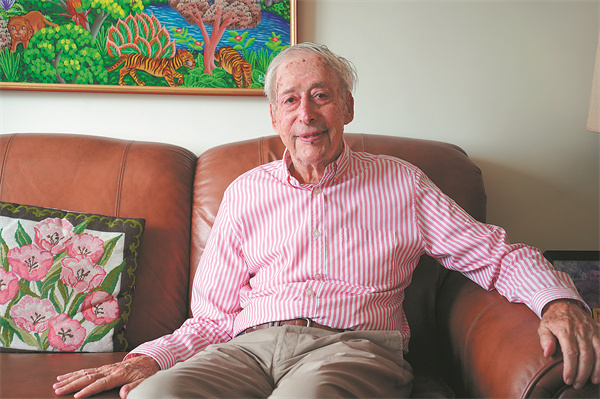

Lindenstraus also had a Chinese family as neighbors in Hongkew. The Chinese family lived downstairs with their children and chickens, while Lindenstraus' family lived upstairs.
They were friendly with each other, but they did not understand each other's languages. Therefore, they communicated using pidgin English, a combination of English, German and Chinese words, Lindenstraus said.
"Believe it or not, the Chinese (who lived in Hongkew) were (treated) worse than we were," he said. "The Japanese treated them terribly. The Chinese had to bow (when they saw the Japanese). We didn't have to bow. But I've seen it. If the Chinese didn't bow deep enough, boom, they were killed. It's terrible."
One school day, Lindenstraus' class went to a public swimming pool outside the ghetto. It was a hot, muggy day, and he and Kirchner spent hours in the pool. When it was time to leave, the two boys did not hear the signal and were left behind, Lindenstraus said.
They were picked up by a Japanese army truck.
"We were very scared," he said. When they finally arrived home, they found Lindenstraus' stepmother was so worried that she blamed everything on Kirchner and his mother, and the two mothers had a big fight.
Sheltered in Shanghai, Lindenstraus, along with many other Jewish refugees, did not know what had happened in Europe and the Holocaust — in which 6 million Jews across Europe were murdered — until Japan surrendered in 1945.
The day the war ended — at first no one knew Japan had surrendered — Kracko's mother remembered waking up early that morning and it was very quiet outside. She had never heard the street so quiet.
Then, she heard people crying in the distance. Then came the laughter. Kracko's mother opened the door to find that all the Japanese stationed at the entrance of the ghetto had evacuated in the middle of the night — the war was over, she realized.
The Chaim family retained almost all evidence of their life in Shanghai, including a dog license issued by the Shanghai Municipal Council. The Jewish couple had a Pekingese when they were living in Shanghai.
In 1949, when the Chaim family was preparing to leave Shanghai and packing their luggage, their dog, not knowing what was happening, chased after their car as they drove away. The small dog, of course, could not catch up to the car and the Chaim family never saw it again.
After the war, Lindenstraus traveled to South America and the United States. Soon after settling in New York, he founded his own company. In his later years, Lindenstraus lived in an apartment three blocks away from his son's family.